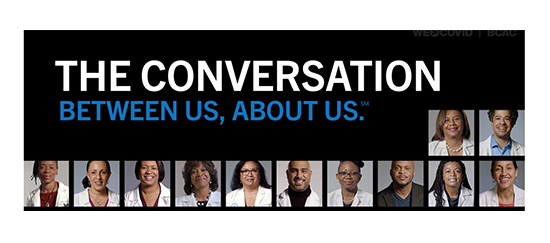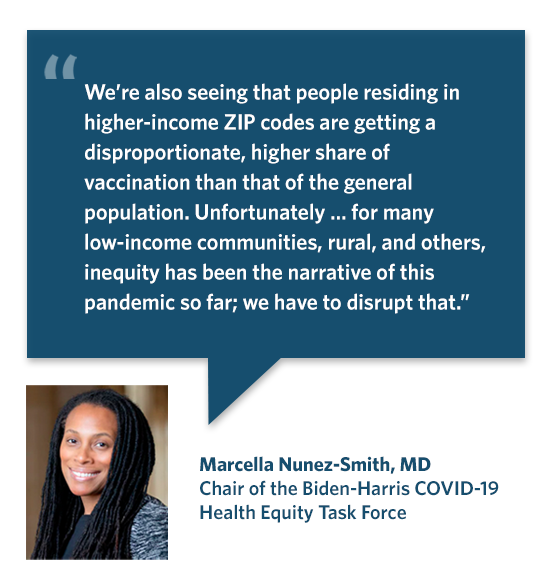
How to Address Concerns Regarding COVID-19 Vaccinations That Exist Within the Black Community
In my last blog post, How to Encourage Your People to Get Vaccinated Against COVID-19, I offered suggestions and resources to help you communicate with your people about the COVID-19 vaccines and to encourage them to get vaccinated. But know that as you develop your communications, you should be prepared to address the concerns that exist within the Black community regarding the COVID-19 vaccinations. If you’re not aware of these concerns, your communications efforts may not hit the mark.
I’ve spoken to family and friends about the COVID-19 vaccines, and I’ve been reviewing information and misinformation presented online. So, take it from a Black woman who knows: While televised news programs, newspapers, and social media platforms may deliver a sort of all-is-going-well message when reporting on the number of COVID-19 vaccines distributed to date, there are still Black people who are fearful of being vaccinated. I get it. I understand that fear. But my fear goes beyond that. I fear that this hesitancy may prove to be deadly; the COVID-19 death rate among Black people is more than double that of white people.
The Hesitancy Is Well-Founded
Our hesitancy is not without merit. It’s not because we don’t know that the novel coronavirus is a killer, that we don’t value our lives or recognize that the spread of COVID-19 must be halted. Far from it. Our hesitancy comes from deep-rooted, historical experiences that have resulted in a mistrust of doctors, medical research, medicine, and the political establishment. This is a direct result of the prejudice and inequities Black people have been subjected to since our ancestors’ feet first landed on American shores. Let’s not forget:
- J. Marion Sims performed experimental surgeries on enslaved women in the 1800s without anesthesia or even the basic standard of care typical for the time because, it is said, he assumed Black people experienced less pain than white people. Surprisingly, a 2016 survey identified that some medical students still believed Mr. Sims’ unfounded notion is true.
- There were Jim Crow laws in the South, which hindered the ability of “coloreds” to gain access to medical facilities and necessary medical treatments.
- In the infamous Tuskegee syphilis experiments, conducted from 1932 to 1972, the U.S. government misled Black male patients to believe they were receiving treatment for syphilis when, in fact, they were not. Even more disturbing, the experimentation was conducted after a cure for syphilis was developed in the 1940s.
A recent article in The New York Times, Bad Medicine: The Harm That Comes From Racism, actually discussed how racial discrimination has affected minority communities when it comes to their belief, or should I say lack of belief, in the health care system. The question has even been posed as to whether it is illegal or even unethical to prioritize racial minorities for COVID-19 vaccines. So, this information is out there, and efforts are underway by federal and private organizations to squash the fear.
The Hesitancy Is Well Known
If you search “black hesitancy” on the internet, you’ll find multiple articles from newsworthy organizations and scholars detailing the history of racism in the medical community and how it persists today. However, we, the Black community, do not need to research the issue. We live it. It’s a discussion we have with our friends, our family members, and our neighbors.
Communications campaigns are springing up, however, in an effort to increase our awareness of the truth surrounding COVID-19. Just listen to the YouTube web series The Conversation: Between Us, About Us. It includes short, to-the-point videos where Black doctors, nurses, and researchers talk about the facts and misinformation surrounding the COVID-19 vaccines. Consider sharing information about the series with your people. It’s very informative.

YouTube web series, The Conversation: Between Us, About Us
As Vaccines Roll Out, Existing Racial Disparities Are Not Helping
I’m open to the fact that you may think racial discrimination, like the events mentioned in the bulleted list above, is in the past. If that’s the case, let’s assume that all Black people are eager to get vaccinated. Have you ever wondered how we’re being reached? Where we can go to receive a vaccination? Or even when we can get an appointment?
I’ve learned that as COVID-19 vaccines roll out, they are disproportionately reaching white communities before Black and other minority communities. This includes minorities who are considered to be front-line workers—including police officers, EMTs, doctors, and nurses. So, unfortunately, even when we want to be vaccinated, difficulties exist. White people are being vaccinated at three times the rate of Black people. New CDC data shows that of those who have received at least the first dose of a vaccine, approximately 6% are Black people compared to 60% who are white people.
Difficulties surrounding the vaccines’ rollouts have been recognized by the Biden-Harris administration. In a recent WebMD Health News article, Black Vaccine Hesitancy Rooted in Mistrust, Doubts, Marcella Nunez-Smith, MD, Chair of the Biden-Harris COVID-19 Health Equity Task Force, talks about the existing disparity. Here’s what Dr. Nunez-Smith had to say:

Marcella Nunez-Smith, MD, Chair of the Biden-Harris COVID-19 Health Equity Task Force
Another survey recently conducted by the Kaiser Family Foundation shows that 6 in 10 Black adults feel that they don't have enough information about where to get the vaccine. It also indicates that as many as 24% say they are not confident that the COVID-19 vaccines have been adequately tested for safety and effectiveness for Black people. Therefore, they would prefer to wait and see how it works on others before being vaccinated, or get it only if required, or not at all.
So, in your communications, connect your people to resources, like county and state websites and the CDC, that provide information about where and when they can obtain a vaccine.
Focused, Spot-On Messaging Is Key
Reach out to all your people, not just minorities, with honest and forthcoming communications. Be cognizant that while all your employees may have questions about the COVID-19 vaccines and want to hear from you about them, minority employees may likely need special communications with targeted messages.
If you need help developing your communications, refer to the National Institutes of Health report that provides in-depth information about how to address vaccine hesitancy. They suggest that “given the diversity of factors that drive vaccine hesitancy in different groups, communication efforts cannot take a one-size-fits-all approach. Effective communication goes beyond the provision of accurate content; it must also be tailored to the community’s values and priorities and come from trusted messengers.”
The report also discusses the value of identifying and partnering with trusted COVID-19 vaccine messengers, like medical network providers, community organizations, and public health agencies. They can help you develop focused communications designed to eradicate any concerns or distrust your people may have about the vaccines.
If you reach out to your people, you may also find that there are those who are willing to help you get the message out—to speak with their colleagues and raise awareness of this important issue. Employees are a valuable resource when it comes to spreading the word.
It’s Critical to Get the Message Out Now
Did you know that if minorities do not get vaccinated, herd immunity, which is vital if we’re to stop the spread of the coronavirus, simply will not happen? White people make up about 60% of the U.S. population. If approximately 70% of Americans need to get vaccinated in order for herd immunity to be achieved, minority vaccination numbers count. Even if every white person gets vaccinated, the U.S. will still not reach herd immunity. So, the sooner you reach out to your minority employees, the better. And when you do, make sure your communications are direct, targeted, and focused on the mission at hand, which is to inform your people of the facts about the COVID-19 vaccines and allay their fears of being vaccinated.
Again, I know that promoting vaccines can feel daunting, especially when it’s to employees who may be averse to being vaccinated. But by doing so, you’ll be performing a much-needed public service.
We’re proud to work with organizations that value their people. If you want to learn more, we’d love to talk.
Read Next
Work with Us
We partner with organizations that value their people first. Let’s talk.

Elena Charleston, Senior Communications Consultant, has 30 years of experience producing successful communications for multiemployer and corporate clients.
